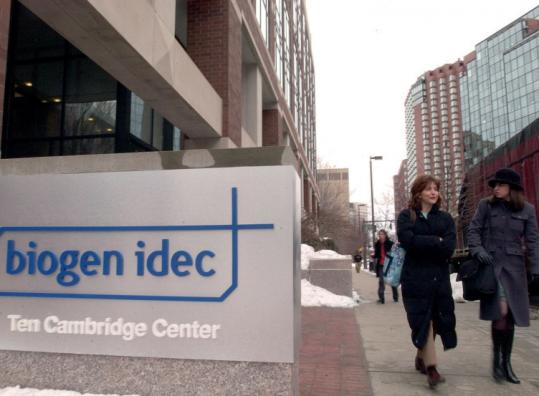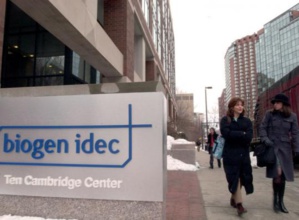Unexpected results of the first phase of clinical trials of a new drug for the treatment of Alzheimer's disease attracted the attention of the players in the pharmaceutical market and gave hope to millions suffering from this common neurodegenerative disease.
Shares of major US Company Biogen Idec has already soared since December by 50%; in the case of success, sales of the drug around the world can be estimated in billions of dollars a year.
In December, the company announced that its experimental drug, Aducanumab, previously known as BIIB037, has significantly stopped patients’ cognitive impairment, according to the results of the Phase I clinical trials. However, doctors limited with general statement, without specifying how effective the drug appeared.
Since then, market analysts and investors began to look forward to the test results, and some of them had flown in France for their announcement on Friday, which took place in Nice at the International Conference on Alzheimer's disease and Parkinson's.
According to doctors, Aducanumab’s action not only met the expectations of experts, but also in some cases surpassed them in terms of the ability to stop the progression of the disease. However, side effects cause fears of what may occur while taking the maximum dose.
-The incredible efficiency, high degree of safety, said an analyst at Credit Suisse, and the same day the company's shares have grown by 10%.
Experts in the treatment of dementia were impressed, but they warn against hasty conclusions, because this is just the very first phase of testing. At the same time, everyone understands that so far, tests of other similar drugs have been proved unsuccessful.
- The results are definitely encouraging, said Samuel Gandhi of the Center for Cognitive Health in New York, adding that the impact of the maximum dose is "very impressive."
Aducanumab (BIIB037) was designed specifically to cleanse the brain of amyloid plaques, which are believed to be the cause of memory loss and other negative manifestations of Alzheimer's disease.
Up to date, no one large scale clinical trial of other drugs has led to positive results.
Johnson & Johnson and Pfiser already refused a jointly developed drug, after it did not show any results. Some experts believe that such drugs can be successful only in a very early beginning of the reception, when the disease has not progressed yet.
The first phase of Aducanumab tests was performed on 166 patients, who were randomly assigned to different doses of the drug or a placebo. The drug not only slows cognitive decline, but also significantly reduces number of plaques in brain, and the higher the dose, the more effective it works.
- It is difficult to assume that these results were random, says neurologist Rachel Doody, who was not involved in the study.
To assess cognitive functions, the patients were given a special 30-point tests. On average, those who took placebo, a year later gained 3.14 points lower, and those with the maximum dose of the drug gained only 0.58 points lower, in average it is 0.75.
Doctors say they would have been impressed with just 20-30 percent reduction functions, while in fact it exceeded 70%.
A side effect of the medication may be specific amyloid abnormalities that can lead to swelling of the brain, especially in those who are genetically predisposed to Alzheimer's disease. According to pharmacists Biogen, swelling often causes no symptoms and may be cut with reduction of dose. However, not everyone agrees.
- Most doctors consider it unacceptable. Side effect is something we definitely do not want patients to have, - says Thomas Wisniewski of the University Medical Center in New York.
The company intends to check the results carrying larger tests later this year.
Shares of major US Company Biogen Idec has already soared since December by 50%; in the case of success, sales of the drug around the world can be estimated in billions of dollars a year.
In December, the company announced that its experimental drug, Aducanumab, previously known as BIIB037, has significantly stopped patients’ cognitive impairment, according to the results of the Phase I clinical trials. However, doctors limited with general statement, without specifying how effective the drug appeared.
Since then, market analysts and investors began to look forward to the test results, and some of them had flown in France for their announcement on Friday, which took place in Nice at the International Conference on Alzheimer's disease and Parkinson's.
According to doctors, Aducanumab’s action not only met the expectations of experts, but also in some cases surpassed them in terms of the ability to stop the progression of the disease. However, side effects cause fears of what may occur while taking the maximum dose.
-The incredible efficiency, high degree of safety, said an analyst at Credit Suisse, and the same day the company's shares have grown by 10%.
Experts in the treatment of dementia were impressed, but they warn against hasty conclusions, because this is just the very first phase of testing. At the same time, everyone understands that so far, tests of other similar drugs have been proved unsuccessful.
- The results are definitely encouraging, said Samuel Gandhi of the Center for Cognitive Health in New York, adding that the impact of the maximum dose is "very impressive."
Aducanumab (BIIB037) was designed specifically to cleanse the brain of amyloid plaques, which are believed to be the cause of memory loss and other negative manifestations of Alzheimer's disease.
Up to date, no one large scale clinical trial of other drugs has led to positive results.
Johnson & Johnson and Pfiser already refused a jointly developed drug, after it did not show any results. Some experts believe that such drugs can be successful only in a very early beginning of the reception, when the disease has not progressed yet.
The first phase of Aducanumab tests was performed on 166 patients, who were randomly assigned to different doses of the drug or a placebo. The drug not only slows cognitive decline, but also significantly reduces number of plaques in brain, and the higher the dose, the more effective it works.
- It is difficult to assume that these results were random, says neurologist Rachel Doody, who was not involved in the study.
To assess cognitive functions, the patients were given a special 30-point tests. On average, those who took placebo, a year later gained 3.14 points lower, and those with the maximum dose of the drug gained only 0.58 points lower, in average it is 0.75.
Doctors say they would have been impressed with just 20-30 percent reduction functions, while in fact it exceeded 70%.
A side effect of the medication may be specific amyloid abnormalities that can lead to swelling of the brain, especially in those who are genetically predisposed to Alzheimer's disease. According to pharmacists Biogen, swelling often causes no symptoms and may be cut with reduction of dose. However, not everyone agrees.
- Most doctors consider it unacceptable. Side effect is something we definitely do not want patients to have, - says Thomas Wisniewski of the University Medical Center in New York.
The company intends to check the results carrying larger tests later this year.






